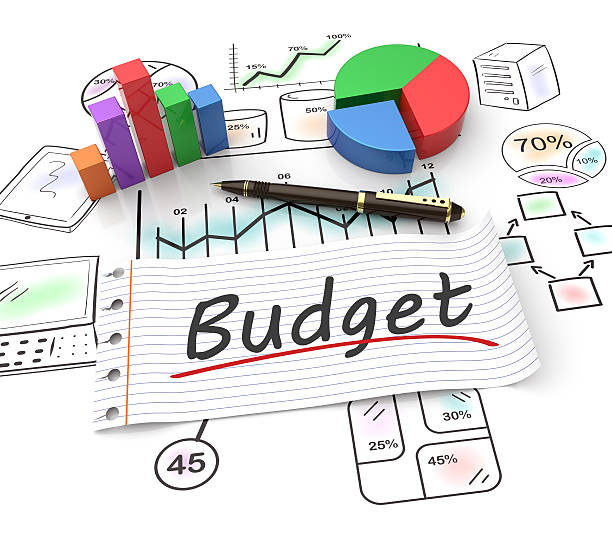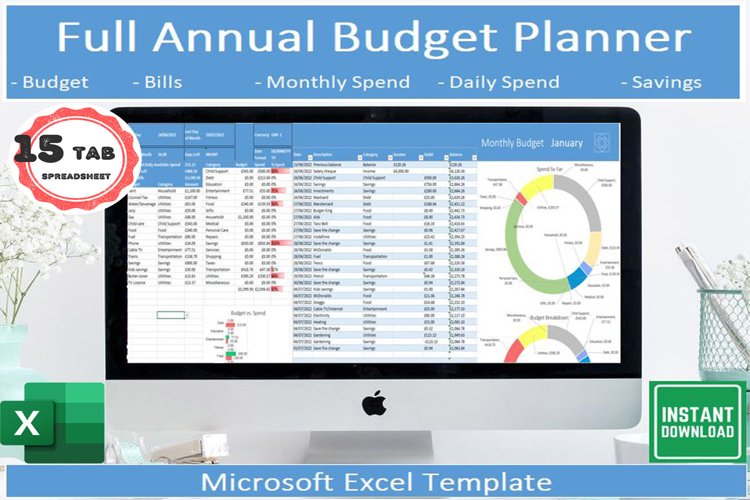
If you’re looking for tips and tricks to help you stay on track with your budget and master the art of budgeting, then you’ve come to the right place. In this article, we’ll provide you with helpful advice and strategies that will help you with better budgeting, plus create a budget and stick to it. We’ll also provide some useful tips for managing your finances so that you can make the most of your money. So, let’s get started and learn how to master the art of budgeting!
Definition of Budgeting
A budget is a plan for how a person or organization is going to spend its money in the future. It serves as a tool to help you manage your money wisely and potentially save more so that you can reach your goals. A budget is also a spending plan that helps you evaluate how much money you are spending and where that money is going. Creating a budget can be simple or complicated depending on your income and expenses.
Benefits of Budgeting
There are many benefits to creating a budget including:
- Saving money
- Setting goals and priorities
- Reducing debt
- Improving your credit score
- Creating financial security
- Reducing stress
Creating a budget can help you get out of debt, save money, and increase your financial security. Because you will have better control over how you handle your money, having a budget can also reduce your stress and help you avoid unexpected expenses.
Download this 12-Month Microsoft Excel Budget Tracker Template

Better Budgeting Tips and Tricks
The tips below will help you better manage your money so that you can reach your goals and live a financially secure lifestyle:
Create a Budget
The first step to creating a strong budget is to write down your income and expenses. This helps you visualize where your money is going and how much money you have available to spend each month. It’s easier to create your budget by using a pen and paper. However, you can also use a software program like Microsoft Excel or Google Sheets. Once you’ve created your budget, be sure to review it regularly and make adjustments as needed.
Identify Your Priorities
Once you know what your income is and where your money is going, you can start setting goals and priorities for yourself. Think about what you want to achieve in life and start making a list of all of the things you want to do. Then, organize them into a priority order from most important to least important. This will help you create a plan that will help you reach your goals.
Track Your Spending
Tracking your spending is another important budgeting tip that will help you stay on track with your budget. You can use a spending tracker to help you keep better track of your monthly expenses. This can help you identify areas where you’re spending too much money and help you find ways to save more money each month.
Set a Savings Goal
It’s important to set a goal to save money each month. You can budget to set aside a certain amount each month for savings by putting it into a separate account that is only used for savings. This will help you reach your savings goal faster. Be sure to only put into savings what you can actually afford. The idea of budgeting money for savings is to save it and not have to pull it out of savings for something other than what it’s intended for.
Pay Bills on Time
One of the best ways to get on the right path to better budgeting is to simply pay your bills on time so you can avoid late fees and other penalties. Setting reminders to pay your bills on time can help you stay on track with your budget and avoid late payments. You can even set up automatic payments so that you don’t have to worry about missing a payment. Paying your bills on time also helps tremendously to improve and raise your credit score.
Get Out of Debt – Reduce Debt
Debt can take a toll on your finances and your budget, so it’s important to reduce debt whenever possible. If you have credit card debt, consider transferring the balance to a credit card with a lower interest rate, or pay off the balance each month to avoid accruing more debt. If you have high-interest loans, consider refinancing them with a lower interest rate or paying off the balance each month to avoid accruing more interest.
One way to get out of debt quicker is by increasing your income. This can also help with reducing debt and improving your budget. Consider taking on a second job or starting a side hustle to bring in more money each month. There are many ways to make money online that will provide more income to help you get out of debt. Having more income can help pay off debt faster and increase savings each month.
Here are some tips on how to get out of debt:
- Create a debt repayment plan and stick to it
- Use debt consolidation services to consolidate your debt into one payment each month
- Try to pay off the debt with the highest interest rate first
- Use a second job or side hustle to bring in more income to pay off debt faster
- Earn more money each month by selling products online through affiliate marketing, or creating and selling your own products
Reduce Expenses
Reducing expenses is another budgeting tip that can help you save more money each month and improve your budget. Depending on your income and monthly expenses, the more unnecessary expenses you cut, the more money you can save each month, thereby saving more and/or reducing more debt quicker.
Look for ways to reduce your expenses by:
- Reduce your monthly expenses (e.g. cell phone bill, cable bill, etc.)
- Eat at home instead of eating out (can save money)
- Sell unused items you no longer need or use (can make money)
- Reduce your property taxes by refinancing your mortgage through a HARP loan or getting a VA loan if you have served in the military (can save money)
- Pay down debt faster to lower your monthly payments and put more money towards your savings (can save money)
- Pay off your mortgage early to avoid extra payments each month and save money on interest charges (can save money)
- Get out of debt quicker by earning more money each month through a second job or side hustle (can save money)

Creating a Budget
Creating a budget that works for you, your income and expenses, and your lifestyle is important. If you create a budget that doesn’t fit your lifestyle and your particular needs, then it won’t last very long and you’ll probably end up going back to your old spending habits.
Instead, create a budget that fits in with your lifestyle and habits. For example, if you drink coffee every morning, then your budget should include a coffee budget that accounts for your coffee habit each month. The more you can account for in your budget, the easier it will be for you to stick to your budget each month and save money.
How to Create a Budget that Works for You:
- Make a list of your income and expenses
- Create a list of your monthly expenses (e. g. cell phone bill, cable bill, etc.)
- Add up your monthly expenses and subtract them from your income
- Identify areas where you can cut back expenses/increase your income (e. g. eating out less, selling unused items you no longer need or use, etc.)
- Create a budget based on your income and expenses
- Set goals for your budget each month and keep track of your monthly progress
- Use a budget tracker to help you stay on track with your budget each month
- Use a spending plan to help you stay on track with your budget each month
- Automate as many of your budget items as possible (e. g. autopay your bills, set up automatic transfers to savings each month, etc.)
- Create multiple budgets if you have multiple income streams with different expenses each month
Establishing Goals
Setting budget goals for your life and reaching them is an important part of creating and sticking to a budget. Creating a budget goal for yourself can help you achieve financial success and reach your financial goals, thereby helping you to get out of debt quicker.
Here are some tips on setting financial goals for yourself:
- Set realistic budget goals for yourself that are achievable within a certain period of time
- Identify your priorities in life and set your budgeting goals based on these priorities
- Create a list of short-term financial goals that will help you reach your long-term goals
- Create a list of long-term financial goals that will help you reach your short-term goals
- Create a financial plan to reach your goals on a regular basis and keep track of your progress on a regular basis
Tracking Spending
Tracking your spending will help you identify areas where you can cut back on expenses and/or make more money each month. Tracking your spending can help you identify your spending habits and help you to pay more attention to where your money is going each month, where you can save money, and/or make more money each month.
Here are some tips on tracking your spending:
- Create a monthly budget based on your income and expenses so you can stay on track with your budget each month
- Use a notebook or spreadsheet to track your spending regularly so you can stay on track with your budget each month
- Use a budget tracker to help you stay on track with your budget each month
- Use a spending tracker to help you keep track of where your money is going each month so you can cut back on unnecessary expenses and/or make more money each month
- Use an app to help you track and manage your spending on a regular basis so you can stay on track with your budget each month
- Use a budget planner to help you stay on track with your budget each month
Stick to the Budget, Avoid the Temptation to Spend, and Prioritize Needs Over Wants
Sticking to your budget can be difficult to do, especially if you have lots of temptations to spend extra money on things you don’t need. However, if you stick to your budget and don’t give in to temptation, then you’ll be able to save money and get out of debt quicker.
Create a budget based on your income and expenses so you can stay on track with your budget each month and avoid the impulse to spend money you don’t have. Set up automatic transfers to savings and payments so you can’t spend money on things you don’t need.
Prioritize your needs over your wants. This means you should focus on meeting your basic needs first (e. g. food, clothing, shelter, etc.) and then meet your wants (e. g. entertainment, vacations, etc.). If you focus on your basic needs first, then you’ll have more money left over to meet your other needs and wants. If you focus on your wants first, then you won’t have any money left to meet basic needs.
Conclusion
In conclusion, mastering the art of budgeting can be a difficult task. However, by following the tips and tricks outlined in this article, you can practice better budgeting, stay on track with your budget, and keep your finances in check. With a little bit of effort and dedication, you can achieve financial success and peace of mind.
